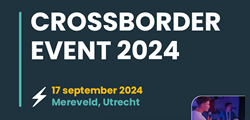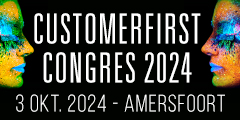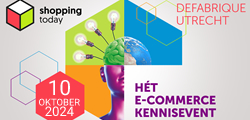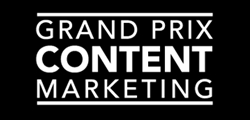[Interview] Martin Peters Ginsborg & Lars Jorgensen (Anomaly): 'Amsterdam is not unlike New York'
- Bureaus
- 4 mrt 2016 @ 10:23
- Link
-
Jeroen Mirck
Redacteur
MarketingTribune - ZakelijkStrategieCreatieInterview
- 4 mrt 2016 @ 10:23
- Jeroen Mirck
Lars Jorgensen and Martin Peters Ginsborg were appointed last year as partners and executive creative directors of the Amsterdam outpost of international award-winning agency Anomaly. MarketingTribune has an exclusive interview with these two creatives, on advertising, A-Lists and Amsterdam. 'We super-charged our office here.'
On the back of the agency’s recent high profile appointment as lead global creative agency for Johnnie Walker, Anomaly Amsterdam bolstered its senior creative power with the recruitment of award-winning creative duo Lars Mars Jorgensen and Martin Peters Ginsborg to the position of partner and Executive Creative Director, working alongside Chief Strategy Officer Amanda Fève.
Before moving to Amsterdam, Jorgensen and Peters Ginsborg helped create award-winning work for Anomaly in New York, Grey, McGarryBowen, Mullen and Saatchi & Saatchi, winning the hearts of global brands like Johnnie Walker, Budweiser, NFL, Marriott, Verizon, Captain Morgan, The Wall Street Journal and Reebok.
The new hires herald the start of an exciting period of growth for the Amsterdam outpost of Anomaly, as the agency launches a global search to recruit exceptional talent, across all disciplines, to work on headline campaigns for clients such as Johnnie Walker and Converse. The Johnnie Walker account will involve all of the Anomaly offices with global leadership out of Amsterdam.
How long have you been working together as a team?
Martin Peters Ginsborg: 'Since the beginning of time. No, jokes aside, we’ve been working together since the early 2000’s, in some shape or form. But as a team, in the classic sense, it’s been about five years. But nothing is really classic anymore now, is it? Being Danes was not what brought us together, but it gave us a slightly different background and has helped us to approach problems in a different manner. That’s why we are still in it together.'
You have a broad track record in agencies. What exactly brought you to Anomaly?
Lars Jorgensen: 'These days, every agency has a different tool. At times they even give it spiffy little names. What we saw when we came to Anomaly was an agency that didn’t talk about film, digital, phygital or any other buzzword, but an agency that said: “We solve business problems”. Period. Regardless of the disciplines needed to find the solution. That made us excited.
Anomaly has an agency model that is different from business as usual: we are motivated to solve business problems, not sell time, or to be compensated for work that works. That allows creatives (as well as strategists, comms planners, account people, data analysts or anyone else that has a great idea) to focus their thinking on where it has the biggest impact. Not having to provide timesheets is an added bonus.'
Martin: 'What I love about the Anomaly model is that it requires a multitude of talent. It allows us to look for broader set of qualities in the people we hire. It forces us to surround ourselves with interesting people and thinkers — we seek out and attract real problem solvers. That keeps all of us on our toes, because we always question the things we think we know. It also means a lot of sharing. Sharing of knowledge between offices. Being small, but nimble and with global reach is the perfect setup. We’re currently of a size that if we have a question, all we need to do is pick up the phone and call our friends in Toronto, New York, London or Shanghai. It is a truly amazing position to be in.'
You were recently named a number four at AdAge’s 2016 A-List. What makes Anomaly stand out from the rest?
Lars: 'Anomaly is driven by an inherent entrepreneurial hunger and curiosity. We encourage it. We bring people in because of their personal drive and energy. Qualities that make them not only great humans, but also deeply engaged in everything they do. We want everyone to keep growing inside and outside of the office. We do that by funding and supporting personal projects. If you want to raise awareness around climate change, we will put our resources behind it like we did with #FeelingTheHeat. It doesn’t matter where you sit in our office or what official label you have; everyone strives to put our clients in the spotlight, and to deliver results.'
You say that Anomaly is ‘the deviation from the norm’. What do you mean by this?
Martin: 'The future of our business will be built on an entirely different type of relationship between brands and agencies. We need to be 100% invested in the success of the brands we work with and that means we have to stay on top of what is happening in the world. In culture. In business. Not just the world of advertising. We need to constantly learn, be nimble and able to shift between disciplines. We can’t just passively sit back and prescribe old solutions. We need to put skin in the game and show our clients that we are ready to invest our resources in their future and become real partners. That means different models for compensation and much tighter partnerships. It means a commitment to using data, truly integrated comms planning and a more nimble production approach. Those are some of the ingredients needed to really kick agencies into a new gear. There is no better way of getting fresh knowledge than by venturing into IP projects. Getting on the other side of the business is healthy, and teaming up with tech partners and other entrepreneurial spirits gives us great insights and inspiration that we can use across all our clients.'
How do you bring a global approach to local markets? How do you do that in New York versus Europe?
Lars: 'In Amsterdam we are a small agency by any standard. While we might have offices globally and talent of international caliber, we are still small and nimble and that’s the same across all offices. Here in Amsterdam, we have people from everywhere: Sweden, UK, South Africa, France, Denmark, Australia, New Zealand and the US to name a few. Everyone is local somewhere and that gives us great native edge with a global thrust.
To be completely honest, the core of our job doesn't change whether you are talking to 100 people or 100 million people. But an informed global outlook is only part of it; flexibility in the idea is essential in order to be truly local in the implementation. So nothing beats spending proper time with local people and local clients to be sure it’s razor sharp when it reaches people’s ears and eyes.'
You claim you seek out, support and develop the best, and most diverse, talent in the business. How do you do that?
Martin: 'First of all, we don’t limit ourselves by looking for talent in usual places. Sure, there are great ad schools, but what we are looking for are people who are true Anomalies. We’ve hired a French team of former pro-gamers for the creative department. We’ve found an editor who also happens to be a steady-cam operator. When we needed a new writer for Converse, we didn’t look for a copywriter, but found a writer who had an article in McSweeney’s.
Importantly, we’re as interested in what people do outside of this office as what they do inside it. Those that only have an interest in what happens at work can be limiting, so we want those people that have real passions and interests outside of this place. In that way we have all kinds of big ideas on how we can bring together a think-tank of young, creative thinkers. We can’t share much more at the moment, but you never know what may come out of it.'
Anomaly has quite a few areas of expertise. Which area is most important to the European market and why?
Lars: 'Europe may be emerging from recession, but the economic rebound here has been slower than that of countries like the US. We can’t take economic growth for granted - or even as a given - and that means we have to push harder for it. We do see light at the end of the tunnel, which is why we’ve super-charged our office in Amsterdam. But to get out on the other side, big European companies need to take a long hard look at their business models, their communication, and their consumer insights. In a relatively fragile Euro-zone, marketers won’t succeed by continuing to play by "the rules" or buying off-the-peg, but by partnering with nimble, strategic thinkers who deliver creative solutions designed to solve a specific, well-defined problem. That’s where Anomaly comes into the picture.'
How do you look back at your work time in New York? How does it compare to Amsterdam?
Martin: 'New York was hard but wonderful. It’s a fast changing, ultra-competitive environment that keeps you on your toes all night (even if you sometimes feel like a short break would be perfectly in order). The advertising industry and business in New York is massive, I think it accounts for about 20% of the industry in the city. You are constantly exposed to amazing talent, and inspiring individuals. There’s a market for interesting digital upstarts, and that drives great thinking. “New Yorkers” are really people everywhere - the up-and-comers, go-getters, re-inventors and doers, that are laying the foundation of our industry for years to come.'
Lars: 'The pace of life outside of work is a tad slower here in Amsterdam, which is actually quite attractive. Especially for people with families. But it is not unlike New York in it’s ability to attract the perfect mix of both global talent and clients. The difference is that there is less bureaucracy, smaller organizations, and that eliminates layers which means that everyone is involved. It ultimately means that everyone working on an account is personally involved and engaged in the quality of the work. But there’s also similarities in terms of creativity in problem solving and healthy competition for ideas, which means that even when the pace is slower out on the canals, the speed of thinking is no slower inside the canal houses.'
What sets the industry here in Europe apart? And why is that attractive to Anomaly?
Martin: 'Much like Anomaly, the spirit of Amsterdam is a place where people rethink business models and rethink the approach of how to solve business problems. The tension between its size and global pool of talent creates a great energy. Being the underdog with global bite allows the industry here to be nimble and question ‘business as usual’. The fact that we all live in a city built below sea level is a great testament to the kind of unreasonable thinking and thinkers this city was founded on. There is a quote by George Bernhard Shaw in our lobby: “The reasonable man adapts himself to the world; the unreasonable one persists in trying to adapt the world to himself. Therefore all progress depends on the unreasonable man”.'
Lars: 'The compactness of the city, combined with its global presence and "small shop feel", creates perfect conditions for a unique work environment. Not to mention that Amsterdam is one of the leading tech-startup cities in Europe. That has definitely created a bubbling environment of smaller production, digital and tech-driven shops who add yet another dimension of knowledge and talent to the city. What’s impressive is the flexibility and diversity of scale; Amsterdam produces everything from global campaigns for iconic mega brands to smaller projects for local start-ups.'
What are your ambitions for Anomaly? What’s coming up next?
Lars: 'Last year we invested all our headspace launching the new global Johnnie Walker campaign. In the process we moved offices and hired a about 30 people. We have a house filled with outstanding talent. This year will be all about unlocking the talent through new great work for our biggest clients, Converse and Johnnie Walker. At the same time we are investing time and effort in making a projects that get under the skin of Amsterdam as a city, and we’ve just started a collaboration with the Dutch National Opera. In a way they are a true Anomaly as well, with some of the modern visions of ballet and opera in the world today.'
What are the major trends in advertising and how should agencies adapt to those trends?
Martin: 'The range of tools and media that we now have at our disposal to tell great stories is unbelievable. The key is to understand how we use tools and platforms well. How do you tell a story that is SnapChat-sized? How do you tell a story that people will bother to tweet about? Digital certainly means a lot of content has become fast and bite-sized, but interestingly it has also opened the door back up for longer and deeper stories. We are now making long form TV shows, and just recently we created an integrated project for KlimaatParade, with a tiny budget and the immense power of social media. So, in short, great stories remain, but the tools we have at our disposal to tell them have exploded.'
Interview: Jeroen Mirck, journalist of MarketingTribune.
-
Jeroen Mirck
- Werkt bij: MarketingTribune
- Functie: Redacteur
- Website:http://www.jeroenmirck.nl
- Profiel »
- agency
- advertising
- interview
- Amsterdam
- creative
- Anomaly
- Lars Jorgensen
- New York
- Martin Peters Ginsborg
- team
Nieuwsbrief
- Mis niets! Schrijf je nu in voor de gratis nieuwsbrief.
- Inschrijven
Laatste reacties
Word abonnee en ontvang:
- ✔ 16 keer per jaar MarketingTribune Magazine
- ✔ Korting tot wel €100,- op events
Meest gelezen
- RIP copywriter Joeri Bakker
- Bibliotheken laten zien wat er allemaal kan in campagne
- Onderzoek: Pride and prejudice in Nederlandse marketingwereld
- Van start-up tot groene marktleider: het verhaal van Packaly
- Natuurhuisje: nieuwe campagne voor Duitsland als...
- Zonbeschermingsmerk Tenue Soleil heeft nieuwe positionering
Laatste Nieuws
- Jubilerend OnlyHuman lanceert nieuwe... 30-08-2024
- Xenos kiest Jump Retail30-08-2024
- RIP copywriter Joeri Bakker29-08-2024
- Campagne Sennheiser: 'Mijn batterij... 28-08-2024
- Samsung en Basic-Fit werken samen... 27-08-2024
- Arjan Koopman over het succesvolle... 27-08-2024
MarketingTribune Events
- 17sep 2024

CrossBorder Event
- 3okt 2024

CustomerFirst Congres
- 10okt 2024

Shopping Today
- 12nov 2024

Grand Prix Content Marketing



